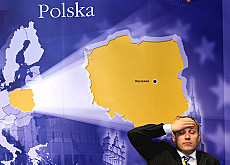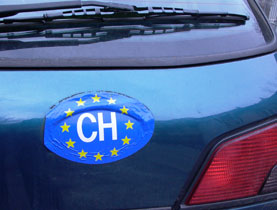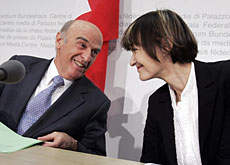EU leaders hammer out treaty deal

European Union leaders have reached an agreement in Brussels on guidelines for drafting a new EU treaty to replace the stalled EU constitution.
For non-EU members such as Switzerland, agreement on a new treaty can only be a good thing, explains a Swiss EU expert.
All 27 leaders – including Poland, which had staged fierce opposition to the proposed treaty – agreed on a “very precise mandate” to draft a streamlined treaty that will guide and govern the expanded EU, said French President Nicolas Sarkozy after the marathon 30-hour negotiations that ended in the early hours of Saturday.
The new treaty, expected to be finalised later this year, preserves much of the planned EU constitution, which was rejected by Dutch and French voters in 2005. The treaty will need to be ratified by each of the EU’s member states, before entering into force in mid-2009.
German Chancellor Angela Merkel, who chaired the talks, said the compromise deal “represents a significant step forward for the European Union”.
Merkel sought to salvage key parts of the stalled constitution necessary to streamline EU decision-making, including overhauling the unwieldy EU voting system and giving the EU more power in policing. Other proposals envisage a long-term president and a foreign affairs head.
“The constitutional treaty was an easily understandable treaty. This is a simplified treaty which is very complicated,” Luxembourg Prime Minister Jean-Claude Juncker commented.
Tough talk
The German chancellor conceded the talks had been hard – with Poland, Britain and the Netherlands each staunchly defending their interests.
The main obstacle had been Poland’s demand to keep its voting power – currently equal to that of Germany’s, even though its population is only half as large.
Provided it is ratified this time, supporters say the treaty should give Europe stronger leadership, a streamlined decision-making process, a bigger voice on the world stage and more say for the European and national parliaments.
“What this means for us is that we are moving out of stoppage,” said Merkel. “We managed to get all 27 states on board in the end.”
No real surprises
Laurent Goetschel, a Swiss expert in European affairs from Basel University, was not too surprised by the news of the last-minute messy compromise.
“The EU has already experienced bigger crises than this one; there were fewer differences of opinion than in previous conflicts. This was mostly about the voting system and measures of application,” he said.
The new voting system – known as a “double majority” – will now be phased-in beginning in 2014 and fully implemented three years later. Under this system, a 55 per cent majority of EU countries with at least 65 per cent of the bloc’s population will be required for a change to be approved.
The deal is also a guarantee for the future functioning of European Commission, said Goetschel.
“It’s definitely a success that 27 member states can work together. In Switzerland we sometimes have difficulties even with seven cabinet members,” he added.
The agreement is not really a new advance for Europe, according to the Swiss expert: “There will continue to be problems, but the EU can now be more self-confident.”
“I don’t think the new treaty will have a great impact on Switzerland, but if the EU is doing well Switzerland also benefits. It’s to our advantage that the EU is more stable and predictable,” said Goetschel.
swissinfo with agencies

More
EU bilateral accords
The treaty is set to include most of the main points of the failed constitution, such as:
– a president of the European Council meetings – the regular gatherings of prime ministers and presidents – for 2.5 years renewable, instead of the current six-month rotating presidency;
– a new foreign affairs chief, with the profile and the budget to give the EU more clout on the world stage;
– fewer national veto powers;
– a voting procedure that lowers the threshold for approval, and matches country’s voting strength to population (phased in between 2014-2017);
– more powers for the European Parliament;
– a slimmed-down European Commission (from 2014).
But both critics and supporters of the project agree that almost 100% of the impact of the constitution has been preserved.
Switzerland is not a member of the European Union.
The federal government describes EU membership as a “long-term option”.
Switzerland is linked to the EU via a series of bilateral accords.
The EU is Switzerland’s main trading partner.
In the 1990s debate over Switzerland’s policy towards Europe polarised the national political landscape.

In compliance with the JTI standards
More: SWI swissinfo.ch certified by the Journalism Trust Initiative



You can find an overview of ongoing debates with our journalists here. Please join us!
If you want to start a conversation about a topic raised in this article or want to report factual errors, email us at english@swissinfo.ch.